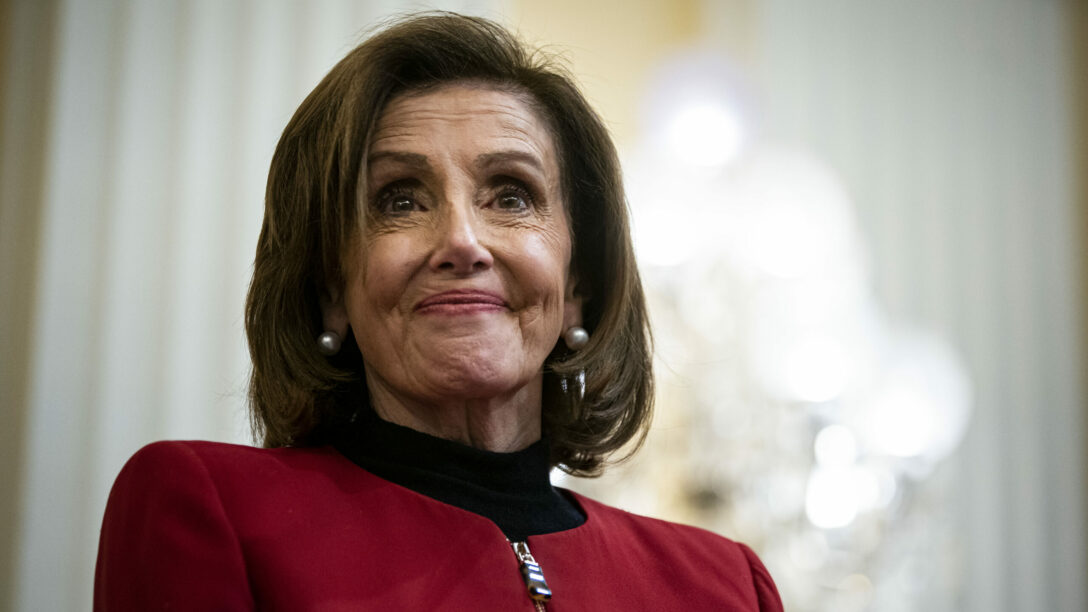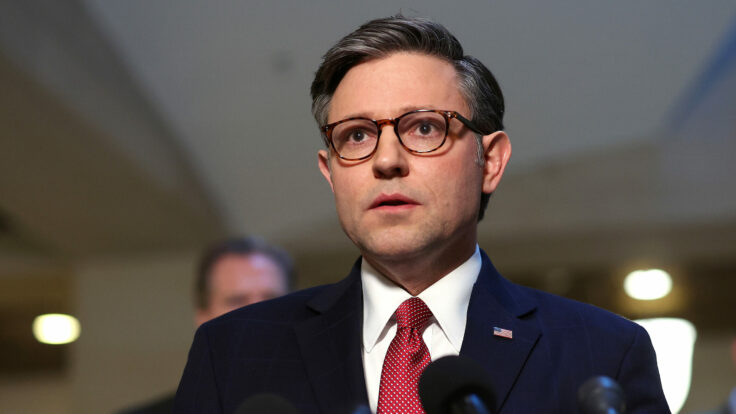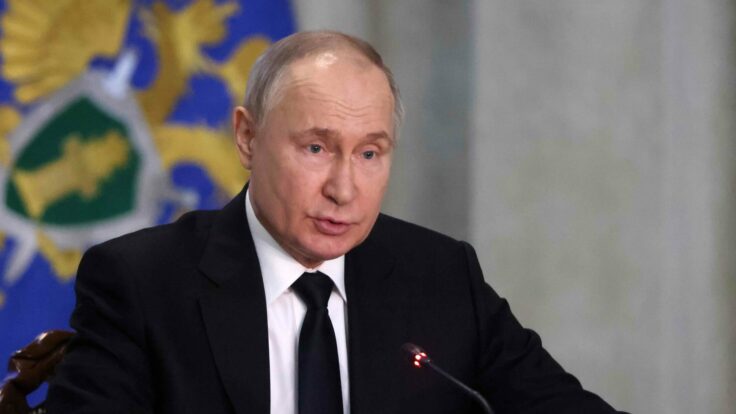As of this writing, it has been 593 days since an American ambassador has inhabited the Villa Taverna, their official residence in Rome. Ever since the financier and Republican donor Lewis Eisenberg moved out at the end of Donald Trump’s administration on January 21, 2021, no one has replaced him. President Joe Biden never nominated anyone, which raised eyebrows both in American foreign policy circles and in Italy. The Romans I’ve spoken to are furious and see it as a sign of unprecedented disrespect, especially at a time when Washington is asking its European allies—including countries dependent on Russian gas, like Italy—to hold the line on anti-Russian sanctions. “It’s the only G7 country with no U.S. ambassador,” one American diplomatic insider told me. “I know the Italians are unhappy and they should be, given the situation politically and what’s going on with Russia.” Given that Russia is rumored to have had a hand in the collapse of Mario Draghi’s sanctions-friendly coalition government this summer, the fact that Washington doesn’t have a representative on the ground is more than embarrassing. It’s downright negligent.
Currently, the United States is represented in Italy by Shawn Crowley, who is the chargé d’affaires. That’s fine, but a chargé doesn’t have the same rank and status as an ambassador, and receiving countries have all kinds of protocols and rules about who can meet with whom. Usually, a chargé has a much lower ceiling for whom they can meet than an ambassador; the rank itself can be quite limiting. “The Italians,” noted the diplomatic insider, “are very protocol conscious.” As are the Ukrainians—so much so that, despite all the aid the U.S. has poured into his country, President Volodymyr Zelensky refused to meet with the American chargé d’affaires until a real American ambassador, Bridget Brink, arrived in Kyiv this May.
Why has Biden left the post in Rome unfilled for so long? It’s been an open secret in Washington that the president is holding the spot for Nancy Pelosi, the first Italian-American Speaker of the House and a minor celebrity in Italy. The idea, apparently, was to give her a nice, cushy retirement gig after Republicans take over the House. But why not nominate someone, like a career foreign service officer, to serve in the post, and then shoo them out once Pelosi ripens to the idea? All ambassadors, after all, serve at the pleasure of the president. I asked spokespeople at both the State Department and the White House about this, but they wouldn’t—and couldn’t—explain to me, even off the record, what the hell is going on there, not even after Fox News published its own story about the Pelosi rumors on Tuesday.
Pelosi’s people, meanwhile, offered a familiar line: Why would Pelosi go get another job when she could just retire to Napa and play with her grandkids? “Fox is just trying to start shit,” one source close to the speaker told me. “There are no conversations with the White House. And I’ve just heard [Pelosi] say ‘S.F. is heaven on earth’ one too many times to believe that she would realistically want to spend her post-Speaker life anywhere but home with family.” Which is also the exact kind of thing you might say before you take a job like that.
The Italian imbroglio is just the tip of the diplomatic iceberg. Over a year and a half into Biden’s administration, more than 20 percent of American ambassadorships remain unfilled. Nearly 40 of them have a nominee that is pending confirmation, including for strategically vital posts, like the Czech Republic, Latvia, and the Netherlands—all crucial allies in holding the line against Russia on Ukraine. There is no American ambassador in Saudi Arabia, a fraught but important ally, and there hasn’t been one since Biden’s inauguration. India, the world’s largest democracy, hasn’t had an American ambassador since then either. The current nominee, L.A. mayor Eric Garcetti, has been in confirmation purgatory for more than a year, held up over allegations that he knew about his chief of staff’s alleged sexual predations. In limbo, too, is the nomination for the ambassador to the U.N.’s Conference on Disarmament. Apparently, the U.S. Senate does not consider nuclear disarmament a pressing matter.
Fifteen more posts are completely vacant, with no nominee anywhere in sight. The abandonment of some places, like Cuba and Afghanistan, make some sense. Other places, like Ethiopia, or Estonia, which is a crucial NATO ally, do not. “There is no reasonable explanation for why more than 20 percent of our ambassadorships overseas remain unfilled,” said Eric Rubin, president of the American Foreign Service Association, which tracks such things. “This is not a world in which we can coast and assume that the rest of the world will wait for us to sort out our parochial difficulties. No other country leaves key diplomatic posts vacant so frequently and for so long.”
The problem, though, is that there is an explanation. In fact, there are several. It began with Trump gutting the State Department and the career foreign service. The people he had nominated to represent the United States were comically unqualified if not outright problematic. Once Biden came in, Washington expected him to right the ship. He had been, after all, an old member of the Senate Foreign Relations Committee and a vice president that had handled some of the most complex foreign policy matters under President Barack Obama. He boasted about his foreign policy chops as well as the coterie of smart, experienced advisors he was bringing in with him: the best and the brightest.
And yet, here we are, more than a year and a half later, and one-fifth of the president’s ambassadors remain unconfirmed or even unnominated. The first problem for Biden was the Presidential Personnel Office, which, in true Democratic fashion, decided that if the previous administration was going to nominate people with criminal records or ongoing lawsuits for ambassadorships, they were going to do things with extra diligence. Chief of staff Ron Klain also decided he had to vet every single nominee, too, slowing the process even further. Meanwhile, over in Foggy Bottom, the State Department decided that its people also had to be extra vetted by diplomatic security, because everyone now had a digital footprint and social media presence.
Then, last July, Texas Senator Ted Cruz took it upon himself to wage a one-man campaign to kill the Nord Stream II project by putting a blanket hold on all the Biden administration’s State Department nominees unless the White House got the German government to kill its pipeline. Since the Biden administration was not about to do so, this created a massive backlog—and that was before Missouri’s Josh Hawley instituted his own blanket hold, in September 2021, on State and Defense Department nominees unless Secretary of State Antony Blinken, Defense Secretary Lloyd Austin, and National Security Advisor Jake Sullivan resigned for, in his view, bungling the withdrawal from Afghanistan.
Needless to say that never happened. By the time these holds were lifted early this year, the backlog had grown massive. And time on the floor of the Senate of the 117th Congress, which will gavel out on January 3, 2023, had grown ever more precious.
But before that, let’s pause to talk about how ambassadorial nominees get to the floor of the Senate for a vote.
First, they have to be approved by the Senate Foreign Relations Committee, which is currently headed by New Jersey’s Bob Menendez, a Democrat, and Idaho’s Jim Risch, a Republican. Both men are steeped in foreign affairs and appear to all outside observers as serious thinkers about world events. But according to people who have regular dealings with the Foreign Relations Committee, they have a relationship that is closer to something out of Mean Girls. They are, as one source familiar with the committee described them to me, “like oil and water.” They have been known to be so laser-focused on messing with each other, in fact, that they regularly inhibit the functioning of the Committee. Said one Senate staffer familiar with the workings of the Committee, “It’s an open secret that the challenges in their working relationship often impedes us from working together constructively on foreign policy and national security issues.”
But there are other issues for ambassadorial nominees to navigate inside the Committee, especially if they’re female. There is only one woman senator on the committee, New Hampshire’s Jeanne Shaheen, and so the women Biden has nominated often run up against the proclivities of the old men of the Senate, especially of the Republican persuasion. “There is certainly a layer of unconscious bias that is holding back a number of women, that isn’t there for the male nominees,” said the Senate staffer. This includes “spouses saying things about Trump” or “the way in which women talk and represent themselves, where Republicans have been viscerally opposed to just how the women communicate.” According to two sources, Sarah Margon, who had run the Washington office of Human Rights Watch and was nominated to lead the State Department’s Office of Democracy, Human Rights, and Labor, ran into trouble when she met with Senator Risch, who pressed her repeatedly on her position on the BDS movement. She opposed it, she said repeatedly. Afterwards, Risch told colleagues he didn’t like Margon’s tone. (A committee spokesperson contended that, “The issue was not and has never been her ‘tone,’ it was her answers to the questions themselves.” The spokesperson did not, however, explain what was wrong with the answers.)
Other women have been pressed by Committee Republicans on their stances on abortion, even if the position they are nominated for has nothing to do with women’s health, let alone abortion. This happened, for example, with Dr. Geeta Gupta, who was nominated to be the Ambassador to the Office of Global Women’s Issues. The post, and the office, deals with women’s security and economic empowerment, and has nothing to do with women’s health, let alone reproductive rights. Yet Gupta was held up by Republicans on the Foreign Relations Committee over her alleged support of abortion, sending Shaheen into a righteous fury. “Republican grandstanding that held Geeta Gupta’s nomination from advancing in the Senate Foreign Relations Committee in July is a pivotal example of this gross display of partisan politics,” Shaheen said in an email. “Republicans prevented her nomination from proceeding to fill the urgently needed role as Ambassador at Large for Global Women’s Issues because of their obsession over women’s health and access to abortion—neither of which are under the jurisdiction of this role. Senate Republicans are putting our security in danger and our credibility on the world stage at risk—it needs to end now.”
The guiding assumption seems to be that if they are women and Democrats, then they are automatically rabid abortionists and will use whatever diplomatic role to advocate for it, from Kyiv to Kinshasa. “Women nominees tend to face more rigor from Senate Republicans and are frequently questioned about extraneous issues like their views on abortion,” another Senate Democratic aide told me. “Some of this happens in public during hearings, but the majority of times it takes place behind closed doors when there are no cameras around to catch a senator and his staff go after women over issues well beyond the scope of the position for which they were nominated.”
Once upon a time, ambassadorial nominees could count on cruising through the Senate on a vote of unanimous consent. They would be advanced as a block of nominees and voted through as a block, and people would only get singled out if they had truly bungled their meetings with senators. The feeling at the time was that the President of the United States deserved to pick his ambassadors just as he deserved to pick his cabinet secretaries and the Senate was there only to weed out the truly rotten apples.
No more. If a nominee even makes it out of committee for a floor vote, they are voted on individually, it takes several hours, and any senator can use the opportunity of their nomination to extract something from the administration. Some, like Hawley, have asked for the resignation of cabinet secretaries. Others have asked for small, stupid things like, for example, a visa for a friend in exchange for waving a nomination through. That is to be expected of Republicans who will do whatever they can to impede Biden’s agenda, but even some Democrats have caught on to the game. They have also learned that they can use any nomination to extract some choice morsel from the administration, whether it’s a pet issue or something they can flaunt to constituents back home.
As a result, every single State Department confirmation hearing, ambassadorial or otherwise, now resembles a hostage negotiation. “This is not how the system is supposed to work,” said one insider familiar with the process. “You’re not supposed to negotiate for individual unrelated reasons. But people have started treating this as normal. I think nominations will look like this forever from now on.”
Because of this, and because there are only four working weeks left on the Senate calendar before the midterms, Majority Leader Chuck Schumer has made it crystal clear to his conference that ambassadorial nominees are now at the very back of the line. Why spend hours on the ambassador to Azerbaijan when you can ram through another lifetime judicial appointment to balance out the work done by Mitch McConnell when he had the majority? “You only have a certain number of hours a week,” one Senate aide familiar with the process told me. “The more we’re spending it on ambassadorial nominations, the less we’re spending it on judges.” Added a Senate Democratic staffer, “It has been made clear that, through the midterms, the floor will be tied up with judicial nominees.”
After the midterms, whether the Democrats hold the Senate or not, it will be a new, 118th Congress and that means all the ambassadorial nominations now floundering in senatorial purgatory will have to be resubmitted, and the process will begin again, from scratch.
Both the White House and State, in their official statements to me, emphasized the number of ambassadors they were able to confirm, despite the unprecedented obstruction they’re facing in the Senate. Things are actually going pretty well, they say, all things considered. But privately, the tone is very different. People worry about recruiting and retention. Who in their right mind would want to go through a process like this? Others worry about the irreparable harm this is doing to our relationships with allies and adversaries abroad, especially after the calamity that was the Trump presidency.
“It’s baffling to our foreign interlocutors because they don’t have these confirmation processes, and our inability to field ambassadors when there are so many crises around the world is unbelievable to them,” one former State Department official told me. “It’s also having a huge impact at State on morale and retention. I think because there’s so much uncertainty over how long it takes to get confirmed, the currency of an ambassadorship is being devalued. You have people waiting for a year or more to get confirmed. People have quit jobs for these posts. Others are waiting inside State, stuck in limbo forever. I heard of someone who considered retiring while waiting to be confirmed.”
Eric Rubin, himself a former ambassador to Bulgaria and deputy chief of mission in Russia, is worried about what message this is sending to the two countries most eager to weaken and replace America on the world stage: Russia and China. “The U.S. no longer has the largest diplomatic service, China does,” Rubin told me. “The U.S. no longer has the most embassies and consulates abroad, China does. We have to stop tying one hand behind our backs in our efforts to represent our country and advance its security and prosperity.”
Or, in the words of the diplomatic insider, “It’s malpractice.”

















